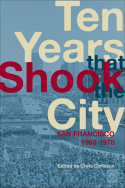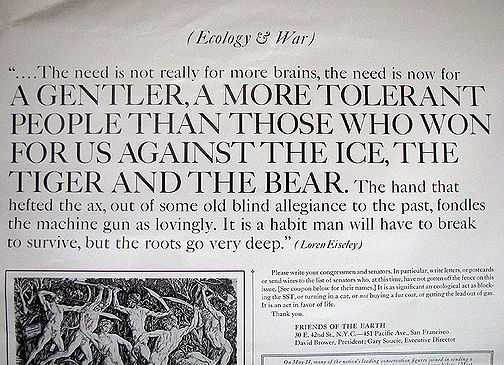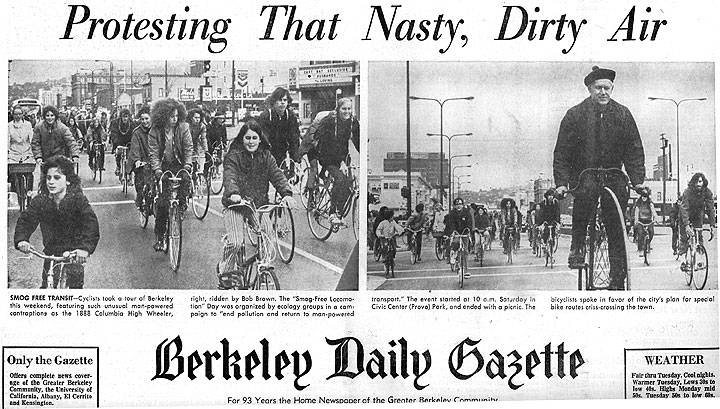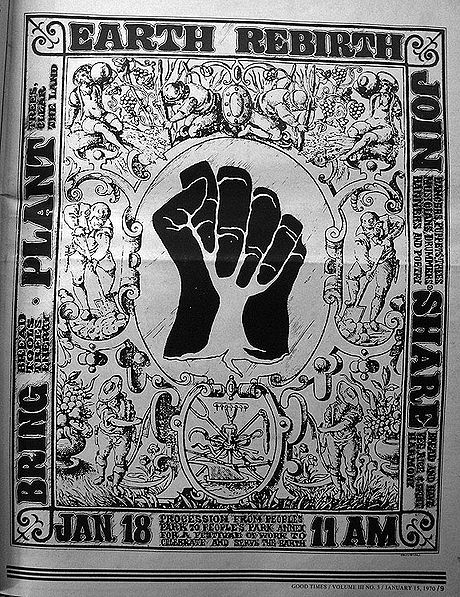Ecology Emerges 1970s
Historical Essay
by Chris Carlsson
Listen to an excerpt from "Ecology Emerges" read by author Chris Carlsson:
<embed src="http://www.archive.org/flow/flowplayer.commercial-3.2.1.swf" type="application/x-shockwave-flash" width="640" height="26" allowfullscreen="true" allowscriptaccess="always" cachebusting="true" bgcolor="#000000" quality="high" flashvars="config={'key':'#$aa4baff94a9bdcafce8','playlist':[{'url':'24ChrisCarlssonBernalHeightsMastered2.mp3','autoPlay':false}],'clip':{'autoPlay':true,'baseUrl':'http://www.archive.org/download/24TenYears--ecologyEmerges/'},'canvas':{'backgroundColor':'#000000','backgroundGradient':'none'},'plugins':{'audio':{'url':'http://www.archive.org/flow/flowplayer.audio-3.2.1-dev.swf'},'controls':{'playlist':false,'fullscreen':false,'height':26,'backgroundColor':'#000000','autoHide':{'fullscreenOnly':true},'scrubberHeightRatio':0.6,'timeFontSize':9,'mute':false,'top':0}},'contextMenu':[{},'-','Flowplayer v3.2.1']}"> </embed>
or download an mp3 here.
A successful tactic of the increasingly politicized ecology movement in the early 1970s was the full-page newspaper ad. This one, sponsored by Friends of the Earth and others, makes the argument that War is environmentally devastating, underscoring the accelerating shift among ecologists to a more systemic critique of business, militarism, and empire.
Massive anti-war demonstrations from 1967-1972 were the cauldron in which the modern environmental movement was forged. The devastation inflicted on Vietnam and Southeast Asia through massive bombardment and an unprecedented use of chemical warfare against nature itself in the region, inspired much direct opposition, but also shaped a new awareness of ecology. Here are excerpts from an open letter by Friends of the Earth in support of a telegram sent to President Nixon by dozens of environmental leaders in 1970:
Ecology & War
<block quote>This advertisement is being placed by Friends of the Earth, a conservation group, but it concerns the war in Southeast Asia, and also wars in general. <block quote>Until recently conservationists have been thought of as content to fight the tragedy of a dam, the outrage of pollution, the spread of ugliness and environmental degradation, and also the economic and political solutions to that sort of mindless destruction. Wars have been someone else’s problem.
<block quote>It has been as though war is not as destructive as dams. Or that an air pollution hazard in Los Angeles is a more significant danger to life than bombs landing upon non-combatants in a war, or the laterizing (turning to rock) of thousands of square miles of formerly living soil by widespread use of napalm. It is as though DDT in our vital tissues is worse than wartime chemical defoliants in the tissues of pregnant women.
It is not true. They are all of equal order, deriving as they do from a mentality which places all life and its vital sources in a position secondary to politics or power or profit. <block quote>Ecology teaches us that everything, everything is irrevocably connected. Whatever affects life in one place—any form of life, including people—affects other life elsewhere. <block quote>DDT on American farms, finds its way to Antarctic penguins. <block quote>Pollution in a trout stream eventually pollutes the ocean. <block quote>Smog over London blows over to Sweden. <block quote>An A-bomb explosion spreads radiation everywhere. <block quote>The movement of a dislodged, hungry, war torn population affects conditions and life wherever they go. <block quote>It is all connected. The doing of an act against life in one place is the doing of it everywhere. Thinking of things in any other way is like assuming it is possible to tear one stitch in a blanket without unraveling the blanket. <block quote>Friends of the Earth, therefore, its Board of Directors and staff, wishes to go on record in unanimous support of the recent telegram to Mr. Nixon, signed by the leaders of the nation’s conservation organizations.
The ecology-war connection goes back to the original A-bombs dropped on Japan, of course, and the 1950s campaign to end atmospheric nuclear testing. Anti-nuclear campaigning in that era was largely led by pacifists and religious organizations, especially the American Friends Service Committee of the Quakers. The spread of radioactive fallout around the planet, overwhelmingly produced by US nuclear testing, inflamed world opinion and led to the Partial Nuclear Test Ban Treaty, signed by President Kennedy in 1963 (it banned nuclear testing in the atmosphere, underwater or in space), though it was never signed by France or China.
Long before Critical Mass rides started in the early 1990s, an earlier wave of ecology-minded folks cycled en masse through the streets of Berkeley in an annual "Smog-Free Locomotion Day, this one held February 28, 1971.
Few remember now that Greenpeace was founded in 1970 in Vancouver, Canada to protest the US government’s testing of nuclear weapons in the Aleutian Islands off Alaska. For the organization’s first five years, its activities focused entirely on combating nuclear testing. Saul Bloom, a San Francisco social justice activist, founder of ARC/Ecology, and long-time ecologist joined Greenpeace in 1977 and worked for the organization for six years. He remembers, “The folks who founded Greenpeace understood the connections between environment, war and peace, and the media—that was fascinating stuff at the time.”
from the Good Times of January 13, 1970.
by Chris Carlsson, from his essay "Ecology Emerges," in the anthology "Ten Years That Shook the City: San Francisco 1968-78" (City Lights Foundation: 2011), edited by Chris Carlsson.
 Find the book at City Lights!
Find the book at City Lights!




